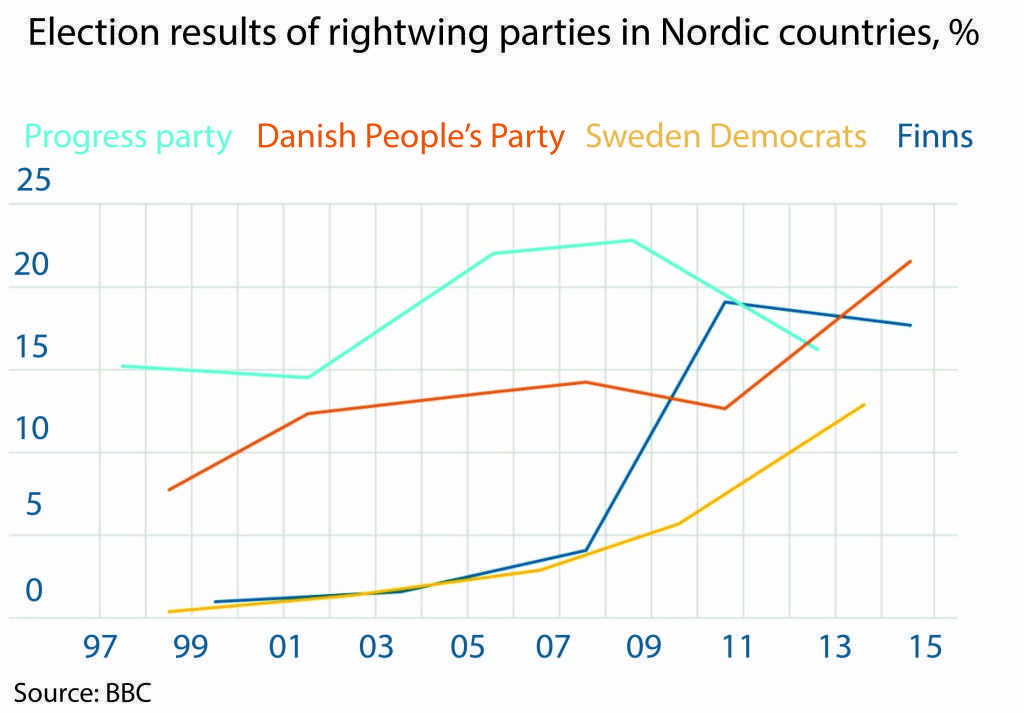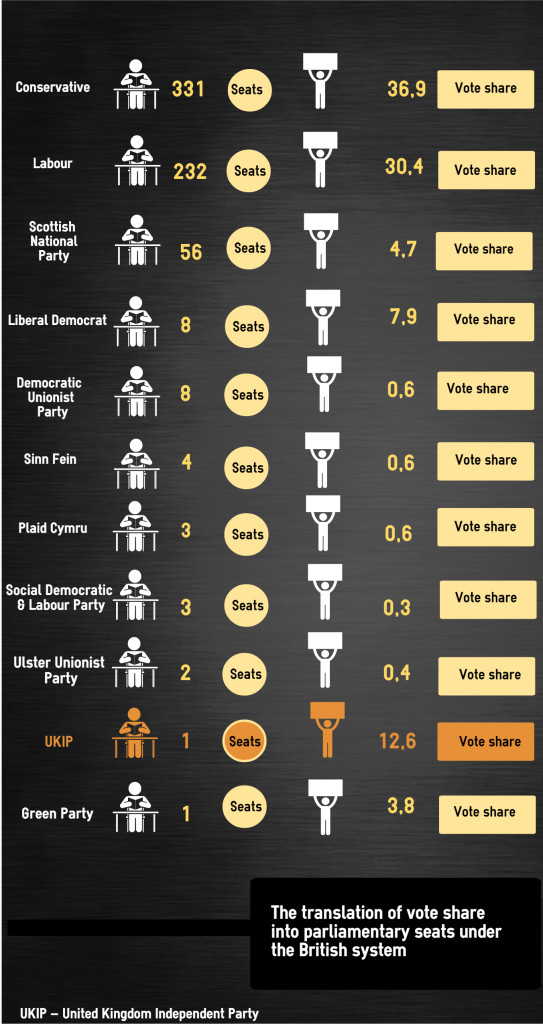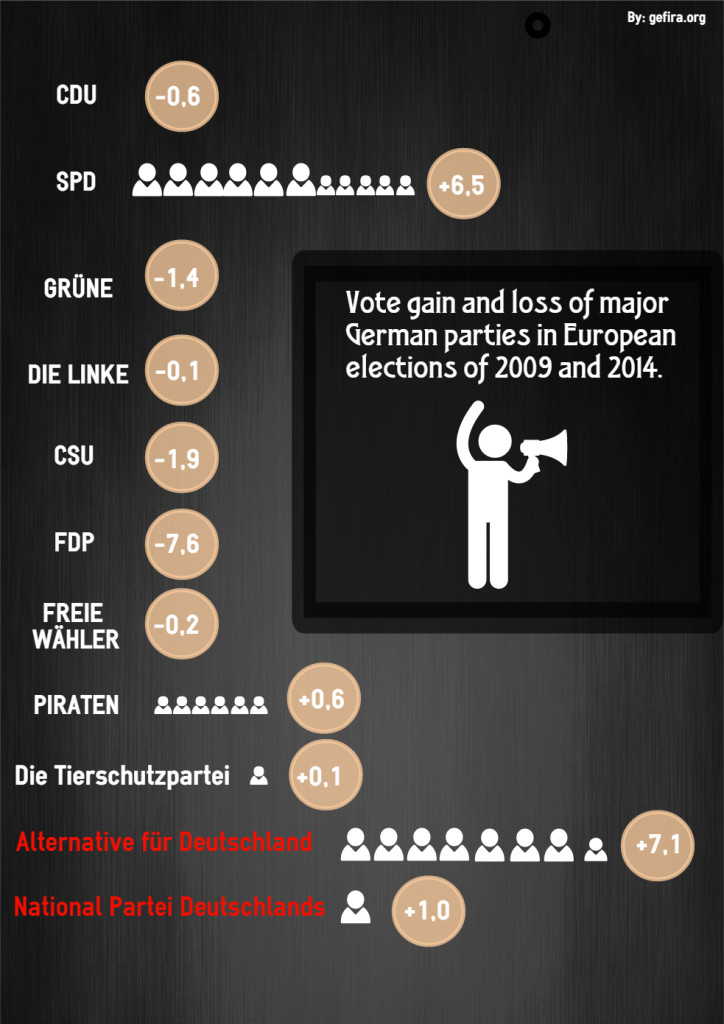Right-wing parties have always been part of the European political scene with the French National Front and the British National Party as well as United Kingdom Independent Party being most talked about. At the polls they may have had quite a large popular support, yet the election systems used in some European countries effectively blocked them from entering national parliaments although they gained a significant share of the vote (see graph for UKIP)1. In some isolated cases when a nationalistically-oriented or a right-wing party won a significant number of parliament seats, it would be shunned by all the remaining parties, and thus rendered politically ineffective, as was the case with the Sweden Democrats2.

Enter the refugees. The swelling numbers of migrants and especially the flood that has taken place over a couple of recent years has made Europeans reconsider their attitude to the phenomenon, and so they started supporting the parties, whose political platform called for stopping the migrant waves. This trend could be observed across Europe, from Italy (Lega Nord), to the Netherlands (the Party of Freedom), to Germany (the German National Party, Alternative for Germany), to Austria (the Freedom Party), to Denmark (Danish People’s Party), to Finland (the Finns).
 Of the right-wing parties Greece’s Golden Dawn and Hungary’s Jobbik are top of the list, with the latter dwarfing with the radical contents of its political platform PM Viktor Orban’s Fidesz3. The factors contributing to the success of the said parties are many as many are the particular national problems, but there’s one thing that they have in common and that has made them soar to greater popularity: anti-migration sentiment. Europeans, even in a country like Sweden, well-known for its liberal immigration policy, have had enough seeing their schools, gyms4, churches and other facilities being converted into refugee or asylum seekers shelters; they have become afraid of the increased crime rate, street scuffles among the various ethnic groups or between migrants and the police, and they are slowly becoming aware of the changing character of some of the oldest European cities5.
Of the right-wing parties Greece’s Golden Dawn and Hungary’s Jobbik are top of the list, with the latter dwarfing with the radical contents of its political platform PM Viktor Orban’s Fidesz3. The factors contributing to the success of the said parties are many as many are the particular national problems, but there’s one thing that they have in common and that has made them soar to greater popularity: anti-migration sentiment. Europeans, even in a country like Sweden, well-known for its liberal immigration policy, have had enough seeing their schools, gyms4, churches and other facilities being converted into refugee or asylum seekers shelters; they have become afraid of the increased crime rate, street scuffles among the various ethnic groups or between migrants and the police, and they are slowly becoming aware of the changing character of some of the oldest European cities5.
A good illustration of the political change is the appearance and rise of the “Alternative for Germany” party. It was founded in 2013 in the wake of the euro crisis and in the same year it had an almost 5% share of the vote for the German parliament. It gained in popularity with a little bit over 7% of the votes in the European parliamentary elections of 2014 and has done its best so far in the local elections in Sachsen, Brandenburg and Thüringen, taking on average almost 11% in those eastern Lands (though half that score in Hamburg and Bremen). The “Alternative for Germany” demands that the border controls be re-introduced, and no asylum granted to people coming from the countries that pose no threat to them.
Common Europeans appear to be split over the migrant issue. While some still hold up banners welcoming the refugees, others resort to extreme measures sending them a signal that they are not welcome here. These negative sentiments are given vent even in arson attacks against shelters where the arrivals are supposed to be accommodated6. A part of the German society has formed the peaceful Pegida (the Patriotic Europeans Against Islamization of the West) movement, staging nationwide protests in cities and towns7.
As if in defiance of these apprehensions Christian churches and Muslim communities in Sweden often team up to coordinate the efforts to provide the arrivals with housing, clothing and food8. In Germany both Catholic and Protestant churches experience dwindling numbers of church-goers, which means many church buildings have not been used for years. These are now being turned into refugee and asylum-seeker shelters with the approval of the churches9. It looks like the divide that splits European nations may petrify.
References:
1. Why are anti-immigration parties so strong in the Nordic states? Source: The Guardian 19-06-2015
2. Why are anti-immigration parties so strong in the Nordic states? Source: The Guardian 19-06-2015
3. The rise of Europe’s far right Source: The Week 12-09-2015
4. Hunderte Turnhallen sind für Schüler geschlossen Source: Die Welt 21-10-2015
5. The rise of Europe’s far right Source: The Week 12-09-2015
6. Migrant Influx May Give Europe’s Far Right a Lift Source: International New Your Times 07-09-2015
7. The rise of Europe’s far right Source: The Week 12-09-2015
8. Behind Sweden’s warm welcome for refugees, a backlash is brewing Source: The Washington Post 19-10-2015
9. Flüchtlinge finden Unterschlupf in deutschen Kirchen Source: Die Welt 28-10-2015




